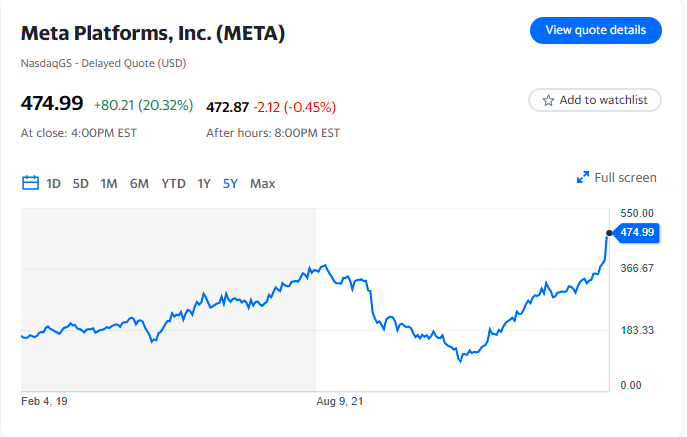The shares of Meta Platforms (META) surged more than 20% on Friday on the release of the company’s new shareholder return initiatives and better-than-expected profits and forecast.
According to Bloomberg data, the company’s market valuation increased by about $200 billion during Friday’s rise, setting a record for the stock market. On Friday, Meta shares were trading at about $475; at its lowest point in 2022, the price dropped as low as $90.
At present, Meta’s market capitalization exceeds $1.2 trillion.

With $40.11 billion in revenue, Meta posted adjusted earnings per share (EPS) of $5.33 for the fourth quarter. Based on $39.01 billion in revenue, analysts were expecting adjusted earnings per share (EPS) of $4.94, according to Bloomberg consensus statistics. In the same quarter of the previous year, the corporation reported $32.2 billion in revenue.
The business also started paying a $0.50 quarterly dividend per share and increased its authorization for stock buybacks by $50 billion. Meta announced that it expects revenue for the current quarter to be between $34.6 billion and $37 billion, which is higher than the $33.6 billion experts had predicted.
In the fourth quarter, Meta’s advertising income exceeded forecasts, coming in nearly $38.7 billion. Additionally, the business disclosed 2.11 billion active Facebook users per day. Wall Street had projected a value of $2.07 billion.
According to the firm, during that time, ad impressions increased 21% over the previous year, while the average price per ad decreased by 2%.
But the corporation is still burdened by Meta’s Reality Labs. The division responsible for bringing Zuckerberg’s metaverse vision to fruition lost an additional $4.65 billion, compared to the $4.3 billion the business lost during the same period last year. Despite this, the division’s revenue exceeded projections, coming in at $1.07 billion as opposed to $812 million.
The introduction of Apple’s competing Vision Pro headset may spur consumer interest in AR/VR headsets and have a positive ripple effect on Meta’s Quest headset lineup.
Nevertheless, investors now prioritize their investments in generative AI over Meta’s Reality Labs initiatives. In an Instagram Reels post from January, Zuckerberg declared that the company’s long-term goal was to create broad artificial intelligence and release it as open source.
Though there isn’t a single definition for generative AI, in general, it’s an AI kind that has human-like thinking and learning abilities. Put differently, it is not limited to a single topic of study, but rather has the ability to comprehend a wide range of concepts.

The business notes, among other things, that payroll expenditures would increase this year as it hires more workers in higher-cost, technical roles during its push into AI features. Meta projects its expenses to reach between $94 billion and $99 billion in 2024.
Additionally, Meta revealed that $3.45 billion was spent on restructuring charges in 2023, which included severance and facility consolidation. As of December 31, 2023, the corporation employed 67,317 people, a 22% decrease from the previous year.
Over the past 12 months, Meta has had a surge in share price of 121%, outpacing companies such as Apple (AAPL), Google (GOOG, GOOGL), Microsoft (MSFT), and Amazon (AMZN).
The company’s market valuation surpassed $1 trillion in January once more.
